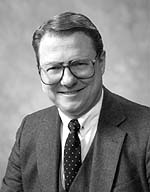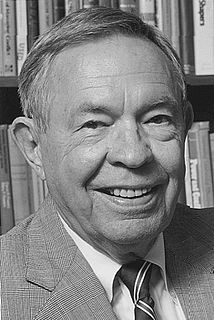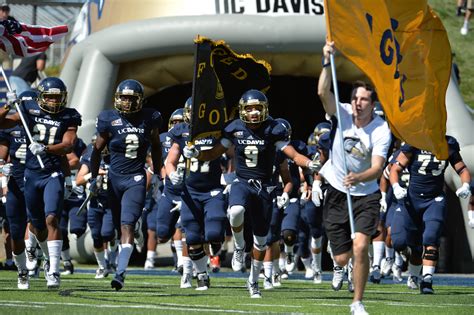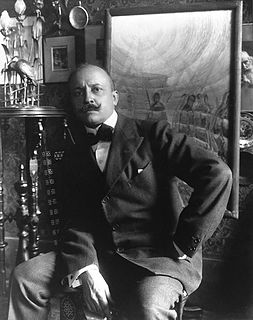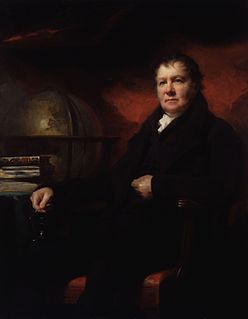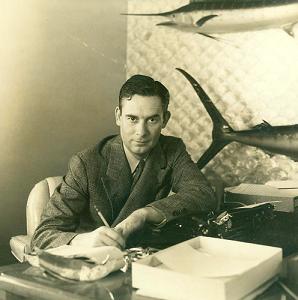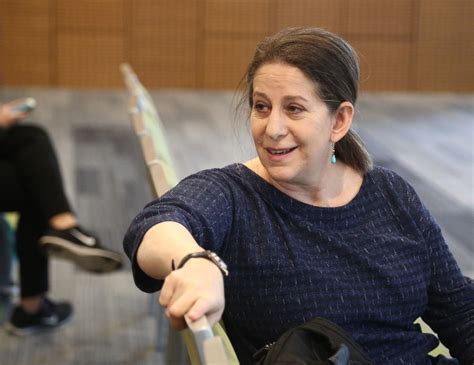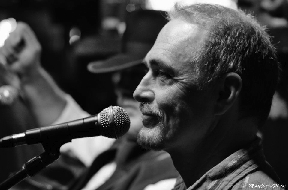Top 294 Infancy Is Quotes & Sayings - Page 5
Explore popular Infancy Is quotes.
Last updated on October 12, 2024.
Life is not stationary. Seconds, minutes, hours, days, weeks, months, and years all tick away at the same clip for everyone. No age-group can be isolated. None of us can settle into infancy, youth, middle age, or old age. We all grow older, and, incidentally, it is an exciting thought if the accent is on growing. "Though our outward man perish," said Paul, "yet the inward man is renewed day by day" (2 Cor. 4:16; italics added).
An adolescent does not rebel against her parents. She rebels against their power. If parents would rely less on power and more on nonpower methods to influence their children from infancy on, there would be little for children to rebel against when they become adolescents. The use of power to change the behavior of children, then, has this severe limitation: parents inevitably run out of power, and sooner than they think.
Taught from their infancy that beauty is woman's sceptre, the mind shapes itself to the body, and, roaming round its gilt cage, only seeks to adorn its prison. Men have various employments and pursuits which engage their attention, and give a character to the opening mind; but women, confined to one, and having their thoughts constantly directed to the most insignificant part of themselves, seldom extend their views beyond the triumph of the hour.
Navajo infants get so attached to cradleboard that they cry to be tied into it. Kikuyu infants in Kenya get handed around several"mothers," all wives to one man. . . . Mothers in rural Guatemala keep their infants quiet, in dark huts. Middle-class American mothers talk a blue streak at them. Israeli kibbutz mothers give them over to a communal caretaker . . . Japanese mothers sleep with them. . . . All these tactics are compatible with normal health--physical and mental--and development in infancy. So one lesson for parents so far seems to be: Let a hundred flowers bloom.
There is something so tender about this to me, about being willing to have your makeup wash off, your eyes tear up, your nose start to run. Its tender partly because it harkens back to infancy, to your mother washing your face with love and lots or water, tending to you, making you clean all over again.
If you pay attention to those aspects of God that demonstrate love, truth, beauty, intelligence, order, and spiritual evolution, those aspects will begin to expand in your life. Bit by bit, like a mosaic, disparate fragments of grace will merge to form a complete picture. Eventually this picture will replace the ore threatening one you have carried around inside you since infancy.
As long as a believer is worrying about whether or not they are truly saved, they will never grow up in spiritual maturity. It basically guarantees that a Christian will remain stuck in spiritual infancy. And worse, it paints a picture of God that is not only untrue but also unbiblical. It cheapens the gift of salvation – the gift of grace – and make God look like a finicky human.
Ugliness, squalor are breeding grounds for revolution. Beauty is conducive to tranquillity, happiness. Beautifying of homes and places of worship began with the dawn of civilization. Beautifying of workplaces is only in its infancy. Yet, since men normally spend more than half of their waking hours at work, surely it is important that adequate attention be devoted to elevating their working environment, whether office or factory, foundry or machine shop, mine or warehouse. Beautiful surroundings subtly encourage beautiful living. Drab surroundings, bad air, bad light, evoke bad reactions.
I dare say you marvel sometimes at my independent way of walking through the world just as if nature had made me of your sex instead of poor Eve's. Trust me, my beloved friend, the mind has no sex but what habit and education give it, and I who was thrown in infancy upon the world like a wreck upon the waters have learned, as well to struggle with the elements as any male child of Adam.
Self-acceptance begins in infancy, with the influence of your parents and siblings and other important people. Your own level of self-acceptance is determined largely by how well you feel you are accepted by the important people in your life. Your attitude toward yourself is determined largely by the attitudes that you think other people have toward you. When you believe that other people think highly of you, your level of self-acceptance and self-esteem goes straight up. The best way to build a healthy personality involves understanding yourself and your feelings.
Enjoy the blessing of strength while you have it and do not bewail it when it is gone, unless, forsooth, you believe that youth must lament the loss of infancy, or early manhood the passing of youth. Life's race-course is fixed; Nature has only a single path and that path is run but once, and to each stage of existence has been allotted its own appropriate quality; so that the weakness of childhood, the impetuosity of youth, the seriousness of middle life, the maturity of old age.. each bears some of Nature's fruit, which must be garnered in its own season.
Last night I encountered a dream cat with a very long neck and a body like a human fetus, gray and transluscent. I don't know what it needs or how to provide for it. Another dream years ago of a human child with eyes on stalks. It is very small, but can walk and talk "Don't you want me?" Again, I don't know how to care for the child. But I am dedicated to protecting and nurturing him at any cost! It is the function of the Guardian to protect hybrids and mutants in the vulnerable stage of infancy.
Happy those early days when I Shined in my Angel-infancy. Before I understood this place Appointed for my second race, Or taught my soul to fancy aught But a white, celestial thought; When yet I had not walked above A mile or two from my first love, And looking back (at that short space) Could see a glimpse of His bright face. When on some gilded cloud or flower My gazing soul would dwell an hour And in those weaker glories spy Some shadows of eternity.
Something really big happened in the world's wiring in the last decade, but it was obscured by the financial crisis and post-9/11. We went from a connected world to a hyperconnected world. I'm always struck that Facebook, Twitter, 4G, iPhones, iPads, high-speech broadband, ubiquitous wireless and Web-enabled cellphones, the cloud, Big Data, cellphone apps and Skype did not exist or were in their infancy a decade ago.
Religion comes from the period of human prehistory where nobody - not even the mighty Democritus who concluded that all matter was made from atoms - had the smallest idea of what was going on. It comes from the bawling and fearful infancy of our species, and is a babyish attempt to meet our inescapable demand for knowledge. Today the least educated of my children knows much more about the natural order than any of the founders of religion.
Flowers... that are so pathetic in their beauty, frail as the clouds, and in their coloring as gorgeous as the heavens, had through thousands of years been the heritage of children - honored as the jewelry of God only by them - when suddenly the voice of Christianity, counter-signing the voice of infancy, raised them to a grandeur transcending the Hebrew throne, although founded by God himself, and pronounced Solomon in all his glory not to be arrayed like one of these.
Every human being lived behind an impenetrable wall of choking mist within which no other but he existed. Occasionally there were the dim signals from deep within the cavern in which another man was located so that each might grope toward the other. Yet because they did not know one another, and could not understand one another, and dared not trust one another, and felt from infancy the terrors and insecurity of that ultimate isolation there was the hunted fear of man for man, the savage rapacity of man toward man.
When will you disembarrass yourselves of the lymphatic ideology of that deplorable Ruskin, which I would like to cover with so much ridicule that you would never forget it? With his morbid dream of primitive and rustic life, with his nostalgia for Homeric cheeses and legendary wool-spinners, with his hatred for the machine, steam power, and electricity, that maniac of antique simplicity is like a man who, after having reached full physical maturity, still wants to sleep in his cradle and feed himself at the breast of his decrepit old nurse in order to recover his thoughtless infancy.
In vain are Schools, Academies, and Universities instituted, if loose Principles and licentious habits are impressed upon Children in their earliest years . . . . The Vices and Examples of the Parents cannot be concealed from the Children. How is it possible that Children can have any just Sense of the sacred Obligations of Morality or Religion if, from their earliest Infancy, they learn their Mothers live in habitual Infidelity to their fathers, and their fathers in as constant Infidelity to their Mothers.
In any age courage is the simple virtue needed for a human being to traverse the rocky road from infancy to maturity of personality. But in an age of anxiety, an age of herd morality and personal isolation, courage is a sine qua non. In periods when the mores of the society were more consistent guides, the individual was more firmly cushioned in his crises of development; but in times of transition like ours, the individual is thrown on his own at an earlier age and for a longer period.
The Author of nature has not given laws to the universe, which, like the institutions of men, carry in themselves the elements of their own destruction; he has not permitted in his works any symptom of infancy or of old age, or any sign by which we may estimate either their future or their past duration. He may put an end, as he no doubt gave a beginning, to the present system at some determinate period of time; but we may rest assured, that this great catastrophe will not be brought about by the laws now existing, and that it is not indicated by any thing which we perceive.
What is life? Thoughts and feelings arise, with or without our will, and we employ words to express them. We are born, and our birth is unremembered and our infancy remembered but in fragments. We live on, and in living we lose the apprehension of life. How vain is it to think that words can penetrate the mystery of our being. Rightly used they may make evident our ignorance of ourselves, and this is much.
The very fact that religions are not content to stand on their own feet, but insist on crippling or warping the flexible minds of children in their favour, forms a sufficient proof that there is no truth in them. If there were any truth in religion, it would be even more acceptable to a mature mind than to an infant mind--yet no mature mind ever accepts religion unless it has been crippled in infancy.
But if in the pursuit of the means we should unfortunately stumble again on unfunded paper money or any similar species of fraud, we shall assuredly give a fatal stab to our national credit in its infancy. Paper money will invariably operate in the body of politics as spirit liquors on the human body. They prey on the vitals and ultimately destroy them. Paper money has had the effect in your state that it will ever have, to ruin commerce, oppress the honest, and open the door to every species of fraud and injustice.
I really am a pessimist. I've always felt that fascism is a more natural governmental condition than democracy. Democracy is a grace. It's something essentially splendid because it's not at all routine or automatic. Fascism goes back to our infancy and childhood, where we were always told how to live. We were told, Yes, you may do this; no, you may not do that. So the secret of fascism is that it has this appeal to people whose later lives are not satisfactory.
My very photogenic mother died in a freak accident (picnic, lightning) when I was three, and, save for a pocket of warmth in the darkest past, nothing of her subsists within the hollows and dells of memory, over which, if you can still stand my style (I am writing under observation), the sun of my infancy had set: surely, you all know those redolent remnants of day suspended, with the midges, about some hedge in bloom or suddenly entered and traversed by the rambler, at the bottom of a hill, in the summer dusk; a furry warmth, golden midges.
To see helpless infancy stretching out her hands, and pouring out her cries in testimony of dependence, without any powers to alarm jealousy, or any guilt to alienate affection, must surely awaken tenderness in every human mind; and tenderness once excited will be hourly increased by the natural contagion of felicity, by the repercussion of communicated pleasure, by the consciousness of dignity of benefaction.
I had always been aware that the Universe is sad; everything in it, animate or inanimate, the wild creatures, the stones, the stars, was enveloped in the great sadness, pervaded by it. Existence had no use. It was without end or reason. The most beautfiul things in it, a flower or a song, as well as the most compelling, a desire or a thought, were pointless. So great a sorrow. And I knew that the only rest from my anxiety—for I had been trembling even in infancy—lay in acknowledging and absorbing this sadness.
The child's true constructive energy, a dynamic power, has remained unnoticed for thousands of years. Just as men have trodden the earth, and later tilled its surface, without thought for the immense wealth hidden in its depths, so the men of our day make progress after progress in civilized life, without noticing the treasures that lie hidden in the psychic world of infancy.
The search for the lessons of the new science is still in progress, really in its infancy. In this realm, three is a new kind of freedom, where it is more rewarding to explore than to reach conclusions, more satisfying to wonder than to know, and more exciting to search than to stay put. Curiosity, not certainty, becomes the saving grace.
Our parents deserve our honor and respect for giving us life itself. Beyond this they almost always made countless sacrifices as they cared for and nurtured us through our infancy and childhood, provided us with the necessities of life, and nursed us through physical illnesses and the emotional stresses of growing up.
To some degree, the critic arises out of that negativity bias in that our brains are oriented towards threat and toward survival. The critic really started as a survivor mechanism in early infancy and childhood when we were trying to navigate our early family system and culture; when we're learning how to fit in so we could optimize that flow of love and affection. It was an internal voice telling us to shut certain patterns and reactions down, that negativity bias that's always looking for what's wrong, looking for the threat.
I was appalled at how children had become the focus and gravitational center of the nuclear family around which parents orbited instead of the traditional arrangement in which children orbited around their parents. This is a huge change because a critical job in early childhood is to get children weaned away from the total narcissism normal to infancy. With the children as the center of the family's actions and decisions, narcissism is at a minimum prolonged and may never significantly decline.
In the Depression, besides everybody being poor, our entertainment was much more primitive and innocent. The comic strip, which I so venerated, was still a very new form. Movies had just become talkies. Radio had just gone coast to coast for the first time. Network radio had just begun when I was a kid. So all of these forms were more or less in their infancy, and feeling their oats. Comics were fresh and funny and nervy, and in a sense, defiant of the prevailing culture.
In Western society, and particularly in American society, imagination is stulified from infancy. The imaginative child is discouraged and upbraided. He is told that the process is mere dreaming, that it wastes time and leads nowhere. It is said to be "impractical." As the child grows and its imagination inevitably leads it to express unconventional ideas and to try new behavior, it is chided and even viciously punished for such signs of unorthodoxy.
The death of a dear friend, wife, brother, lover, which seemed nothing but privation, somewhat later assumes the aspect of a guide or genius; for it commonly operates revolutions in our way of life, terminates an epoch of infancy or of youth which was waiting to be closed, breaks up a wonted occupation, or a household, or style of living, and allows the formation of new ones more friendly to the growth of character.
Scientific societies are as yet in their infancy. It is to be expected that advances in physiology and psychology will give governments much more control over individual mentality than they now have even in totalitarian countries. Fitche laid it down that education should aim at destroying free will, so that, after pupils have left school, they shall be incapable, throughout the rest of their lives, of thinking or acting otherwise than as their schoolmasters would have wished.
North Korea invites parody. We laugh at the excesses of the propaganda and the gullibility of the people. But consider that their indoctrination began in infancy, during the fourteen-hour days spent in factory day-care centers; that for the subsequent fifty years, every song, film, newspaper article, and billboard was designed to deify Kim Il-sung; that the country was hermetically sealed to keep out anything that might cast doubt on Kim Il-sung's divinity. Who could possibly resist?
Infancy is the realm conveyed to us in dreams which look backward to the past. Adolescence, more like a work of art, is a prospective symbol of personal synthesis and of the future of humankind. Like a work of art that sets us on the pathway to new discoveries, adolescence promotes new meanings by mobilizing energies that were initially invested in the past.
Slavery may, perhaps, be best compared to the infantile disease of measles; a complaint which so commonly attacks the young of humanity in their infancy, and when gone through at that period leaves behind it so few fatal marks; but which when it normally attacks the fully developed adult becomes one of the most virulent and toxic of diseases, often permanently poisoning the constitution where it does not end in death.
But perhaps God is strong enough to exult in monotony. It is possible that God says every morning, "Do it again" to the sun.; and every evening, "Do it again" to the moon. It may not be automatic monotony that makes all daisies alike; it may be that God makes every daisy separately, but has never gotten tired of making them. It may be that He has the eternal appetite of infancy; for we have sinned and grown old, and our Father is younger than we.
Every politically controlled educational system will inculcate the doctrine of state supremacy sooner or later. . . . Once that doctrine has been accepted, it becomes an almost superhuman task to break the stranglehold of the political power over the life of the citizen. It has had his body, property and mind in its clutches from infancy. An octopus would sooner release its prey. A tax-supported, compulsory educational system is the complete model of the totalitarian state.
Human life has no meaning independent of itself. There is no cosmic force or deity to give it meaning or significance. There is no ultimate destiny for man. Such a belief is an illusion of humankind's infancy. The meaning of life is what we choose to give it. Meaning grows out of human purposes alone. Nature provides us with an infinite range of opportunities, but it is only our vision and our action that select and realize those that we desire.
Witness the American ideal: the Self-Made Man. But there is no such person. If we can stand on our own two feet, it is because others have raised us up. If, as adults, we can lay claim to competence and compassion, it only means that other human beings have been willing and enabled to commit their competence and compassion to us--through infancy, childhood, and adolescence, right up to this very moment.
Language development, for instance, has a critical period that begins in infancy and ends between eight years and puberty. After this critical period closes, a person’s ability to learn a second language without an accent is limited. In fact, second languages learned after the critical period are not processed in the same part of the brain as is the native tongue.
Progress, far from consisting in change, depends on retentiveness. When change is absolute there remains no being to improve and no direction is set for possible improvement: and when experience is not retained, as among savages, infancy is perpetual. Those who cannot remember the past are condemned to repeat it. In the first stage of life the mind is frivolous and easily distracted; it misses progress by failing in consecutiveness and persistence. This is the condition of children and barbarians, in which instinct has learned nothing from experience.
In the infancy of civilization, when our island was as savage as New Guinea, when letters and arts were still unknown to Athens, when scarcely a thatched roofed hut stood on what was later the site of Rome, this contemned people had their fenced cities and cedar palaces, their splendid Temple, their fleets of merchant ships, their schools of sacred learning, their great statesmen and soldiers, their natural philosophers, their historians and their poets.
The healing power of music is vast. Music therapy is in its infancy in Western psychology. If we knew more, we'd be able to do amazing things, and maybe even make permanent changes in the brain's mysterious workings. With a simple song and four chords, you might be able to do something useful, even life-changing. With all the songs you know, you might be a virtual, veritable medicine chest for the right person.
As kings are begotten and born like other men, it is to be presumed that they are of the human species; and perhaps, had they thesame education, they might prove like other men. But, flattered from their cradles, their hearts are corrupted, and their heads are turned, so that they seem to be a species by themselves.... Flattery cannot be too strong for them; drunk with it from their infancy, like old drinkers, they require dreams.
I find no change of consequence in grown people, I do not miss the dead. It does not surprise me to hear that this friend or that friend died at such and such a time, because I fully expected that sort of news. But somehow I had made no calculation on the infants. It never occurred to me that infants grow up...These unexpected changes, from infancy to youth, and from youth to maturity, are by far the most startling things I meet with.
...fiction is made out of the writer's experience, his whole life from infancy on, everything he's thought and done and seen and read and dreamed. But experience isn't something you go and get - it's a gift, and the only prerequisite for receiving it is that you be open to it. A closed soul can have the most immense adventures, go through a civil war or a trip to the moon, and have nothing to show for all that "experience"; whereas the open soul can do wonders with nothing.
This is the pleasantest part of life. Oblivion throws her light coverlet over our infancy; and, soon after we are out of the cradle we forget how soundly we had been slumbering, and how delightful were our dreams. Toil and pleasure contend for us almost the instant we rise from it: and weariness follows whichever has carried us away. We stop awhile, look around us, wonder to find we have completed the circle of existence, fold our arms, and fall asleep again.
